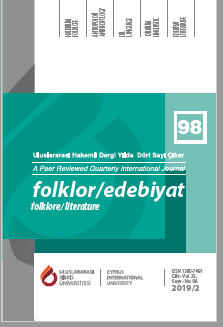Türk Kültüründe Eril Mekân Örneği; Köy Odaları
An Example for Masculine Space in Turkish Culture: Village Rooms
Author(s): Erdi AksakalSubject(s): Cultural history, Customs / Folklore, Regional Geography, Culture and social structure , Evaluation research
Published by: Uluslararası Kıbrıs Üniversitesi
Keywords: ahi-order; belonging; masculine rooms; traditions; social structure;
Summary/Abstract: This study elaborates on village rooms, which come forward as the space for social and cultural identities within Turkish cultural life. These rooms still exist in Cinis village of Erzurum Province. These rooms with folk architecture have the same character with dwellings such as council of friends, youth organization and man room. In this sense, masculine rooms have significant functions in the rural areas where traditions are dominant as the public spaces in which individuals feel they belong to somewhere and surrounded with values. In public dwellings –also called as masculine rooms in some regions- the needs of the rooms are regulated with cooperation arising as collective work and herfene. Besides, all needs of these rooms –from cleaning to heating- are maintaned on shift basis and within some certain rules. Participation to the room and the responsibilities about the room are shaped based on voluntarism. The unity, solidarity and generosity in this structure is fed with ahi-order and Turkish Islamic guild within Turkish society.
Journal: Folklor/Edebiyat
- Issue Year: 25/2019
- Issue No: 98
- Page Range: 291-308
- Page Count: 18
- Language: Turkish

